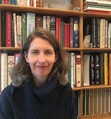Lory Widmer Hess's Blog
October 5, 2025
Month in Review: September 2025
Fall weather is in the air; we’re just about to leave on a trip to the mountains for a few days, and I hope we won’t be rained or fogged or snowed in! But if we are, I’ll be sure to bring along plenty of reading material.
Here’s what I polished off this month:
What I read in September: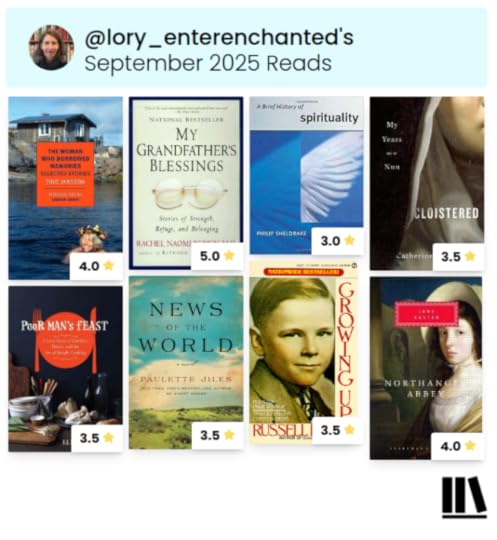 The Woman Who Borrowed Memories
, by Tove Jansson, translated by Thomas Teal and Silvester Mazzarella
My Grandmother’s Blessings
by Rachel Naomi Remen
A Brief History of Spirituality
by Philip Sheldrake
Cloistered
by Catherine Coldstream
Poor Man’s Feast
by Elissa Altman
News of the World
by Paulette Jiles
Growing Up
by Russell Baker
Northanger Abbey
by Jane Austen
The Woman Who Borrowed Memories
, by Tove Jansson, translated by Thomas Teal and Silvester Mazzarella
My Grandmother’s Blessings
by Rachel Naomi Remen
A Brief History of Spirituality
by Philip Sheldrake
Cloistered
by Catherine Coldstream
Poor Man’s Feast
by Elissa Altman
News of the World
by Paulette Jiles
Growing Up
by Russell Baker
Northanger Abbey
by Jane Austen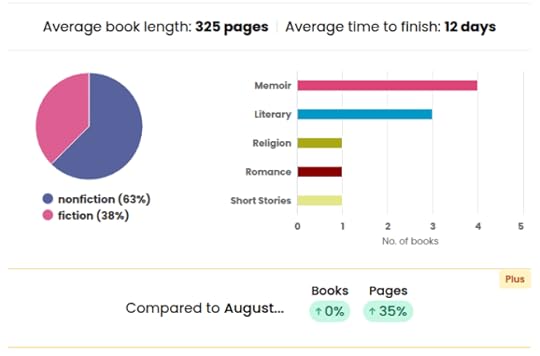 Solid reads
Solid readsI gave a lot of books 3.5 stars this month; that means they were really solid, enjoyable reads for me, and I’d consider reading them again, even if they didn’t have that extra something that makes me rate them 4 stars. (I reserve 5 stars for personal favorites I know I’ll read again and again, even if they’re not perfect.)
This month, I put three memoirs in that category. Growing Up is a classic memoir of, um, growing up during the Depression, which I know I read many years ago. My son was interested in some memoir recommendations, so I checked this out for him via the e-library we share, and then ended up reading it myself! While life may seem too short for rereading, I find that after 40 years or so I’m such a different person that any good book deserves another look from me. I had a very different perspective on this one than when I was a teenager, for sure, less amused by the funny parts and more struck by the tragic, traumatic elements, which, at the time it was published, were not the main focus in memoir land.
Now it’s a different story. After writing Poor Man’s Feast, Elissa Altman got into trouble with her family for outing a secret about her father’s traumatic past that she didn’t know was a secret. That’s looking ahead to the subject of her latest book, Permission, which I’m interested in, but I wanted to read this first for background. It is sad to read this one with hindsight and know many of the people she wrote about so affectionately, chronicling their relationship as it revolved around food, are going to cut her out. However, there is a happier trajectory in her finding true love with the woman she’s now married to.
Then there was Cloistered, about a nun who ends up leaving her convent. Coldstream writes beautifully and poetically about the monastic life, but a bit vaguely about the personal tensions and toxic relationships that led to her exit. It was fascinating to read and sometimes frustrating, but overall valuable as a glimpse into an enclosed world, where very human tendencies proliferate in the midst of mighty spiritual effort. I appreciate that Coldstream doesn’t write off spirituality or monasticism in general, as a result of her painful experiences, but wonders how we can preserve their good aspects in our world today. I wonder that, too.
Currently readingI’ve just checked out Jane Austen’s Bookshelf, which I plan to take along on vacation. With one more book in my year-long reread of Jane Austen’s novels to go, I’m looking forward to being guided by a rare book dealer through the forgotten women authors who influenced Austen.
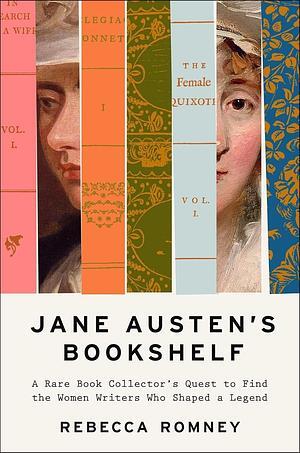 On the blogIn
Do you ever write to writers?
I described how I try to reach out to authors whose works I enjoy, as writing can be a lonely business.
On the blogIn
Do you ever write to writers?
I described how I try to reach out to authors whose works I enjoy, as writing can be a lonely business. What’s on your shelf this month?
Linked at The Sunday Post at Caffeinated Book Reviewer, the Sunday Salon at Readerbuzz, and the Monthly Wrap-up Round-up at Feed Your Fiction Addiction
September 21, 2025
Do you ever write to writers?
When I was a child in school, I was never assigned the task of writing to an author — thank goodness, as such mandated correspondence is the dullest and most pointless kind. However, I did once write to the favorite author of my adolescence, Robin McKinley, and she not only answered with a real letter, which she sat down and typed on official stationery in her publisher’s office (this was 1984), but sent me a copy of a book of hers I had not been able to find, not yet having access to online bookstores. It was probably the high point of my young life!
This success did not set me off on a spate of writing to more of my favorite authors, for which they would probably be thankful, if they knew what they were missing. But now that I’ve become an author myself, I notice that it is nice to hear from readers. The most popular writers must be inundated with electronic mail, with assistants to deal with it, hardly looking at it themselves. But those lower down on the literary totem pole might appreciate some evidence their words are being received and heard. Everybody seems to want to write and publish these days, but who is reading all those words? A lot of very worthwhile writing gets less attention than it deserves. So I thought that maybe I could reach out to some of the writers whose work I’ve enjoyed.
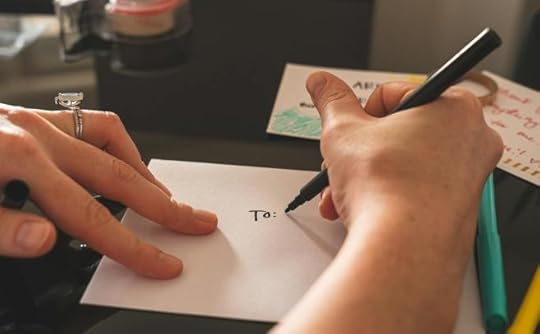 Photo by Castorly Stock on Pexels.com
Photo by Castorly Stock on Pexels.comI could write online reviews, of course, and I do, but a personal note might be appreciated from time to time. So I’ve started sending these, whenever I feel moved to do so. If I don’t have something substantial to say — other than “I loved your book!” — I usually refrain. But when I do have some particular passages to praise, or want to share how something especially inspired or comforted me, I’ve started to reach out.
I’ve held back from asking many questions, as I fear those might be annoying. I was not so polite with Robin McKinley, demanding to be told how I could find her book, as well as what her favorite books were — “and don’t say War and Peace,” I insisted, since I was tired of having boring classics urged on me. She seemed to find it all charming, but then, I was 15 years old. These days, I try to be more respectful of boundaries. One doesn’t want to cause authors to feel they’re being harassed, or stalked. A book I recently read, Tove Jansson’s The Woman Who Borrowed Memories, brought this to my attention — she includes a couple of stories that must have been based on her own experience, where fan correspondence can be gratifying but also a little unnerving. I hope to stay on the positive side of that line.
 Photo by Dương Nhân on Pexels.com
Photo by Dương Nhân on Pexels.comHave you ever written to a writer whose work you enjoyed, or considered doing so? How did that turn out?
September 7, 2025
Month in Review: August 2025
As I reported last week, reading books by women in translation was something I wanted to do this summer, and I did it! Four of those were in August, plus one by a man in translation (I had been confused), and three mysteries. I do seem to gravitate to those in the summer.
What I read this month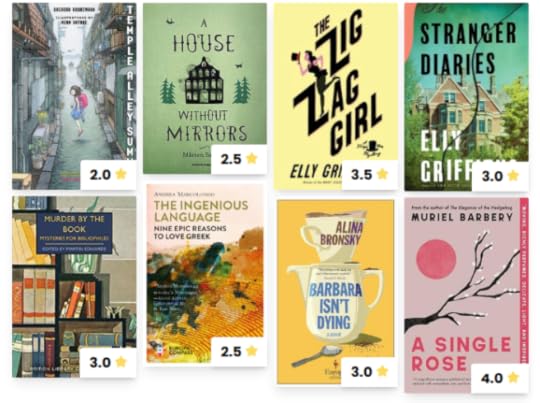 Temple Alley Summer by Sachiko Kashiwaba – Women in Translation
A House without Mirrors
by Marten Sanden
The Zig Zag Girl
by Elly GriffithsThe Stranger Diaries by Elly Griffiths
Murder by the Book
, edited by Martin EdwardsThe Ingenious Language by Andrea Marcolongo – Women in TranslationBarbara Isn’t Dying by Alina Bronsky – Women in Translation
A Single Rose
by Muriel Barbery – Women in TranslationHow one book leads to another
Temple Alley Summer by Sachiko Kashiwaba – Women in Translation
A House without Mirrors
by Marten Sanden
The Zig Zag Girl
by Elly GriffithsThe Stranger Diaries by Elly Griffiths
Murder by the Book
, edited by Martin EdwardsThe Ingenious Language by Andrea Marcolongo – Women in TranslationBarbara Isn’t Dying by Alina Bronsky – Women in Translation
A Single Rose
by Muriel Barbery – Women in TranslationHow one book leads to anotherLast month, I had a moment of Book Serendipity when I closed Magpie Murders and picked up Storybook Ending – which starts out with a character putting a note into a copy of Magpie Murders she’s dropping off at her favorite bookstore, hoping a particular bookseller will find it.
At the end of the book, one character recommends The Stranger Diaries to another, and I thought I might as well follow up with that. I actually tried a couple of books by Elly Griffiths, and enjoyed them both, so was glad to have been introduced to a new author by chance.
Have you experienced such chains of happenstance in your reading?
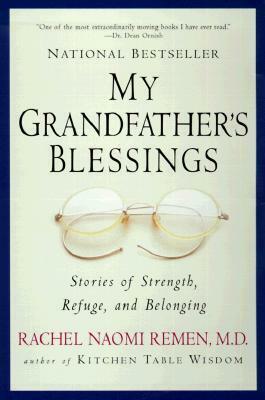 Currently reading
Currently readingAfter loving Kitchen Table Wisdom some years ago, I don’t know why I waited to long to read Rachel Naomi Remen’s follow-up, My Grandfather’s Blessings, but I’m glad to be reading it now. Full of pithy wisdom drawn from real life and deep feeling, I could read such “little stories” forever. They model the kind of person I would like to be, and I don’t think I can praise a book more highly than that.
Sacred ReadingSpeaking of books as food for life, this month also saw my experiment in exploring reading as a sacred practice, as I offered free online meetings each day for a week. It was a wonderful experience, and I am continuing with less-frequent offerings, as well as a podcast for those who can’t attend in person – see the Sacred Reading page for details. It would be lovely to have more friends join us!
On the blog On the Matterhorn Trail , in which I visited one of Switzerland’s major tourist attractions Women in Translation and Ten Books of Summer , a review of summer readingWhat’s on your shelf this month?

Linked at The Sunday Post at Caffeinated Book Reviewer, the Sunday Salon at Readerbuzz, and the Monthly Wrap-up Round-up at Feed Your Fiction Addiction
August 31, 2025
Women in translation and ten books of summer
I aimed to read women in translation this summer (August is earmarked as #WITMonth), and I did read quite a few. I’m happy I got to meet so many new-to-me authors, and revisit a couple of favorites, but regret the lack of diversity in my list. I need to branch out beyond Europe and Japan! Next year I’ll make that a priority.
Here are ten books I read this summer – some of which were on my original Ten Books of Summer list, others picked up along the way. Have you read any of these, or others by the same authors? What books by women in translation can you recommend?
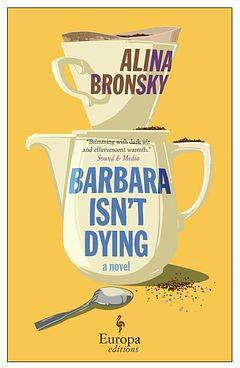
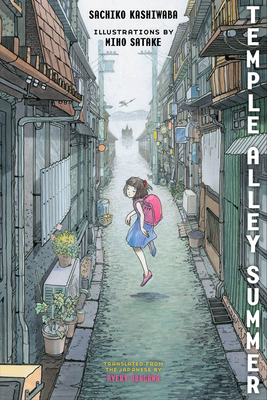
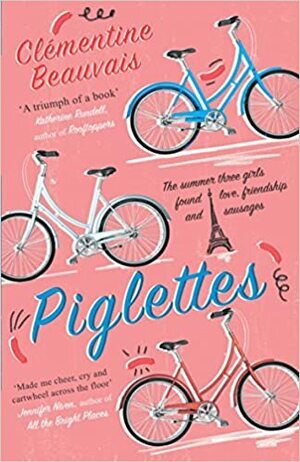
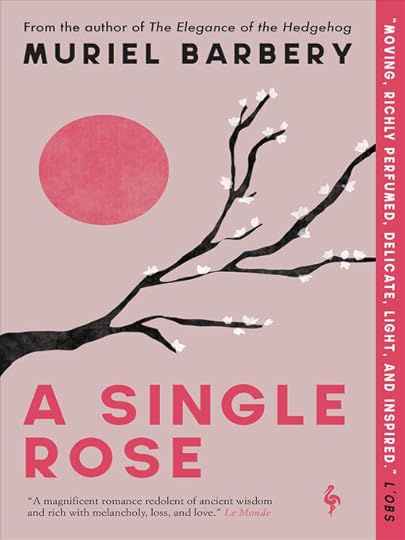
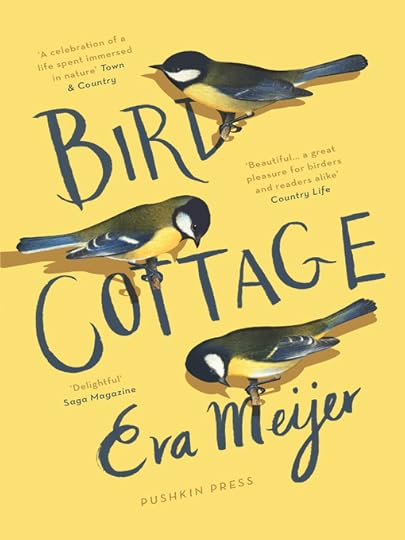
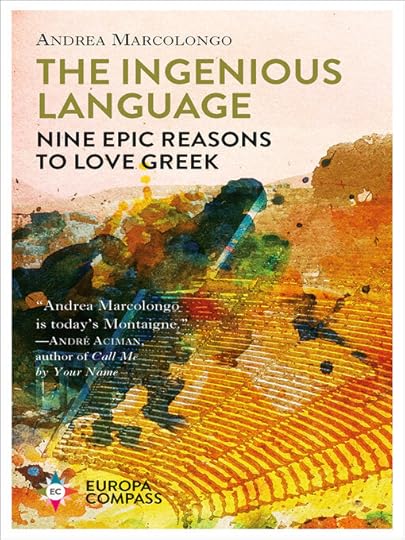
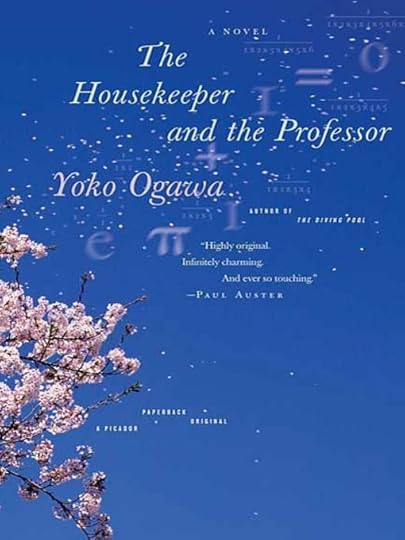 My favorites
My favoritesBird Cottage by Eva Meijer, translated from Dutch by Antoinette Fawcette
Piglettes by Clementine Beauvais, translated from French by the author
The Housekeeper and the Professor by Yoko Ogawa, translated from Japanese by Stephen Snyder
A Single Rose by Muriel Barbery, translated from French by Alison Anderson
The Woman Who Borrowed Memories by Tove Jansson – I’m still in the middle of this book of short stories, but I already know it will be a favorite. Translated from Swedish by Thomas Teal and Silvester Mazzarella.
Also worth readingThe Enlightenment of the Greengage Tree by Shokoofeh Afar, anonymous translation from Farsi
Mina’s Matchbox by Yoko Ogawa, translated from Japanese by Stephen Snyder
Barbara Isn’t Dying by Alina Bronsky, translated from German by Tim Mohr
DisappointmentsTemple Alley Summer by Sachiko Kashiwaba translated from Japanese by Avery Fischer Udagawa
The Ingenious Language by Andrea Marcolongo, translated from Italian by Will Schutt
10 Books of Summer Survey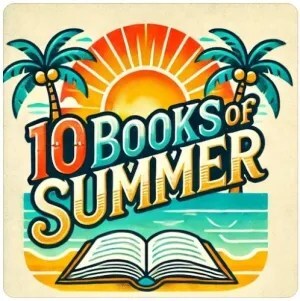
Emma shared some questions to wrap up this challenge:
Did you manage to finish all 10/15/20 books? If not, what kept you from completing the challenge? – My list varied from my original plan, but I did manage to read at least 10 books. Not listed above are the two books I read for the Jane Austen 2025 – Mansfield Park and Emma. I’m counting those as well.Of all the books you read this summer, which one(s) was/were your favorite and why? – See above – click through the links to my StoryGraph reviewsDid you DNF any? Why? – There were several books I started but didn’t finish – One was A Good Life by Virginie Grimaldi, a tale of grown up sisters dealing with a traumatic childhood. Though there were some funny and poignant moments, I got bored with the time-switching structure halfway through. Which book surprised you the most, either by being better or worse than you expected? I was surprised and disappointed that The Ingenious Language: Nine Epic Reasons To Love Greek did not give me nine epic reasons to love Greek.Did you notice any patterns in the genres you chose or enjoyed this summer? – Of this list, nearly all were realistic fiction, but with a wide variety of styles and moods: lyrical, ironic, comic, reflective, fantastical…Other than these books by women in translation, and Jane Austen, I tended to gravitate to mysteries this summer.Which one had the best cover? – I like all the cover designs above. I notice a theme of “three elements” – three bicycles, three birds, three branches – that tends to make for a harmonious design.Which one was the longest? And the shortest? – The longest book I read this summer was Emma (431 pages). Shortest was The Ingenious Language (178 pages).Did you read them mostly in print? ebook? audio? All digital – except Jane Austen, which I’m reading from my owned hardcovers.
AND NOW FOR SOMETHING MORE CREATIVE:
8. Imagine you’re hosting a “20 Books of Summer” book club wrap party.
Which book would you nominate as the guest of honor, and what kind of toast or speech would you give celebrating it? – I’d nominate The Housekeeper and the Professor for the most touching portrayal of an unusual friendship. In my toast, I’d try to manage to work in some mathematical metaphors, though I might need help with those from somebody whose math is better than mine.
9. Looking back at all the characters you met over the summer, which one would you want as a summer buddy for a weekend getaway, and what activity would you do together? – I’d love to go on a bike trip through France with Mireille from Piglettes!
August 17, 2025
Postcards from Switzerland: On the Matterhorn trail
After living in Switzerland for 6 years, I had still not seen the iconic Matterhorn peak – and nor, I may add, had my husband, though he was born here. But when friends visited this summer from North America, they wanted to go to the big M, and so we decided to come along.
 View from above Grächen
View from above GrächenIt’s not an easy spot to get to, one reason why we’d never made the pilgrimage. The last town in the Mattertal, Zermatt, is not accessible by car; you have to park and take a shuttle, then a cog railway to the best viewing spot. From our house, we drove about three hours into the Valais, where we rented a place lower down the valley for a few nights (staying in Zermatt proving very pricey). At first the weather was not at all good for visiting the higher peaks, which were buried in clouds. So we spent one day around the town of Grächen, a pleasant alpine spot.
 First glimpse of the Matterhorn from the train climbing up from Zermatt
First glimpse of the Matterhorn from the train climbing up from ZermattFortunately, the next day the clouds cleared and we headed upwards. It took almost 2 hours by car, shuttle, and train, but at last we made it to the top – Gornergrat is the end of the line. Climbers can go higher, but we were just there to look around.
 A glacial silhouette
A glacial silhouetteOverall, this area was not exactly our style, though I was glad to see it once — an impressive, but bleak landscape, with a strange overlay of commercial tourist attractions: restaurants, hotels, souvenir shops, etc. The Matterhorn is striking because of its shape and the way it stands alone from some of the surrounding peaks.
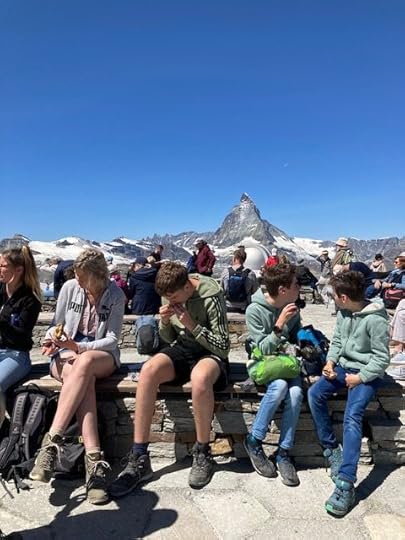 The crowded viewing platform – how many languages were being spoken here, I wondered?
The crowded viewing platform – how many languages were being spoken here, I wondered?We had lunch and photo ops on the Gornergrat viewing platform, finishing up with munching some Toblerone. Then we walked down to the Riffelsee, a lake which in many dramatic photographs of the mountain looks much bigger than it did to me on this occasion. The weather lately had been dry, so maybe at other times it has more water.
 Me and the mountain – the Riffelsee is the puddle down below
Me and the mountain – the Riffelsee is the puddle down belowWhen taking my own photo I framed my shot to make the lake look pristine and deserted, though it wasn’t at all — the hordes of chattering tourists with their cameras were here too!
 View from the Riffelsee, minus tourists (you can see their footprints in the mud)
View from the Riffelsee, minus tourists (you can see their footprints in the mud)On our way home, we stopped in Saas-Fee, a more comfortable kind of area I could imagine visiting again. There were lots of lovely hikes around here, too, without being quite such an exhausting journey.
 Entering the village of Saas Fee – a village surrounded by 18 peaks over 4000 meters
Entering the village of Saas Fee – a village surrounded by 18 peaks over 4000 metersStill, it was certainly a unique and memorable trip, and I’m glad we did it. If you came to Switzerland, what would you most want to see? Would you make the effort to see the Matterhorn?
 Gornergrat panorama
Gornergrat panorama
August 9, 2025
A week of sacred reading starts tomorrow
For anyone interested in the sacred dimension of reading, I’ve created a week of free online meetings to introduce a contemplative way of engaging with texts–not necessarily “religious” in the conventional sense. I’m very excited to share this practice with you all, as it’s been transformative in my own life. Each meeting will be independent, and it’s never too late to sign up.
I intend to make this an ongoing offering, and to create videos for those who can’t participate in person, so even if you can’t join at the scheduled times, I hope you’ll let me know of your interest.
I’ve created a new Sacred Reading page on the website which will always include the upcoming dates and other information. You can sign up for updates using the contact form at the bottom of that page.
I’m looking forward to seeing some of you in the coming week!
August 2, 2025
Month in Review: July 2025
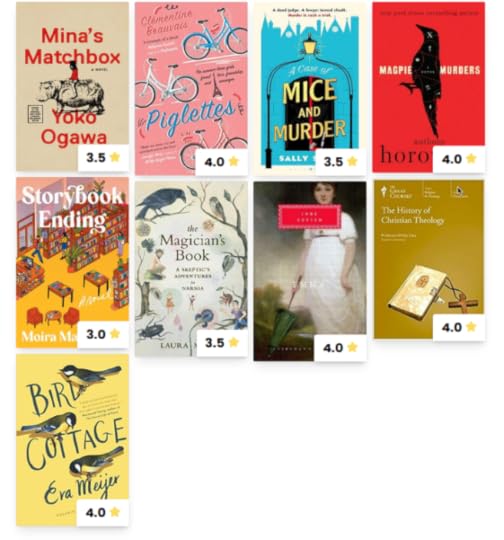 Mina’s Matchbox by Yoko Ogawa, translated by Stephen B. Snyder – Women in Translation (Japanese)
Piglettes
by Clementine Beauvais, translated by the author – Women in Translation (French)A Case of Mice and Murder by Sally Smith
Magpie Murders
by Anthony Horowitz
Storybook Ending
by Moira Macdonald
The Magician’s Book
by Laura Miller – Reread
Emma
by Jane Austen – Reread, Read Austen 2025
The History of Christian Theology
by Phillip CaryBird Cottage by Eva Meijer, translated by Antoinette Fawcett – Women in Translation (Dutch)
Mina’s Matchbox by Yoko Ogawa, translated by Stephen B. Snyder – Women in Translation (Japanese)
Piglettes
by Clementine Beauvais, translated by the author – Women in Translation (French)A Case of Mice and Murder by Sally Smith
Magpie Murders
by Anthony Horowitz
Storybook Ending
by Moira Macdonald
The Magician’s Book
by Laura Miller – Reread
Emma
by Jane Austen – Reread, Read Austen 2025
The History of Christian Theology
by Phillip CaryBird Cottage by Eva Meijer, translated by Antoinette Fawcett – Women in Translation (Dutch)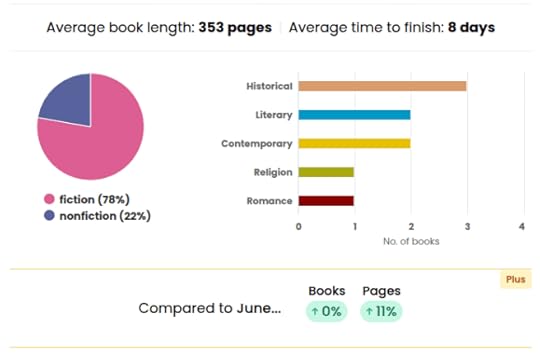 Paris in July – A book I recommend
Paris in July – A book I recommendPiglettes by Clementine Beauvais (Les petites reines in French) was a quick, breezy read about a girl-power road trip, perfect for summer! Three teenage girls targeted by a bully in their school (who named them as “winners” of an ugliness contest) strike back by going on a two-week bike ride to Paris, selling gourmet sausages along the way. Along with asserting their right to take up space, each has a private agenda. They have to deal with sudden social-media fame, as well as navigation, weather, journalists, and other challenges of the road, while their perspective and goals undergo changes. But friendship will get them through.
The book was translated into English by the author, a good thing, I think, as it includes lots of wordplay and irony, and the narrator, Mireille, has a very unique voice. In either language, a French delight!
Currently reading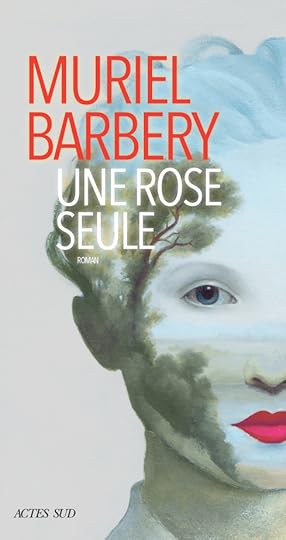
As we’ve done for the past several summers, Emma of Words and Peace (who runs the yearly Paris in July event) and I have chosen a book to buddy-read in French. This year, it’s Une rose seule by Muriel Barbery, a short, poetic book I am looking forward to after last year’s Madame Bovary.
Emma has read it before, but she says she’s happy to go through again and savor every word, she liked it so much. That bodes well for me, as I will have to spend extra time just to comprehend a sufficient number of words. I’m looking forward to the challenge.
If anyone wants to join, contact Emma for the link to our Discord group — discussion in French, but it’s very low-key. A translation by Alison Anderson is also available – perfect for Women in Translation month!
Coming up: A week of sacred readingLectio divina, or sacred reading, is an ancient contemplative practice that has brought me many gifts. I thought it would be lovely to share it with others, so starting on August 18 I’m offering a week of daily online meetings — all are welcome, and the content will not always be conventionally religious. Check out this page to learn more and sign up.
If you’re interested, but not able to join this time, please sign up anyway — I’ll send at least one recording of the basic practice, and keep you informed of upcoming events.

What’s on your shelf this month?
Linked at The Sunday Post at Caffeinated Book Reviewer, the Sunday Salon at Readerbuzz, and the Monthly Wrap-up Round-up at Feed Your Fiction Addiction
July 27, 2025
A week of sacred reading
As I recently posted in my blog newsletter and Substack, The Enchanted Circle, I’d like to offer an opportunity for those interested in reading as a sacred practice to gather online. It would be so wonderful to share this practice with others!
Going forward, such gatherings might take place once or twice a month. As an introduction, I decided I’d offer a whole week of daily meetings to give the greatest chance that those who might want to participate will be able to do so, at least once.
Each session will be a 40-minute Zoom meeting, using this sequence:
5 minutes gathering5 minutes reading of a text – from the Bible or other sources (suggestions welcome)5 minutes reflecting on the text (with writing, drawing, or other expressive methods if desired)5 minutes responding to the text (with a personal prayer or intention)5 minutes silent contemplation15 minutes optional sharing of thoughts and experiencesHere are the dates and times I’ve chosen. Times are given as Central European Time; please use a time zone converter to find the time for your zone.
Sunday, August 10: 4 pm CETMonday, August 11: 8 pm CETTuesday, August 12: 8 pm CETWednesday, August 13: 8 pm CETThursday, August 14: 10 am CETFriday, August 15: no meetingSaturday, August 16: 7 pm CETSunday, August 17: 4 pm CETIf you are interested, please respond using the contact form below, and I will send you the Zoom link, further information, and reminders for future meetings. Even if none of the times works for you, I might create recordings or other resources to share.
If you have a suggestion for a reading text, please use this form as well.
Submit a form.I’m excited to give this a try, and I hope to meet some of you there. If you have any questions, please feel free to ask in the comments.
 Detail from Virgin Reading (c. 1510), Vittore Carpaccio. National Gallery of Art, Washington, D.C.
Detail from Virgin Reading (c. 1510), Vittore Carpaccio. National Gallery of Art, Washington, D.C.
July 12, 2025
Month in Review: June 2025
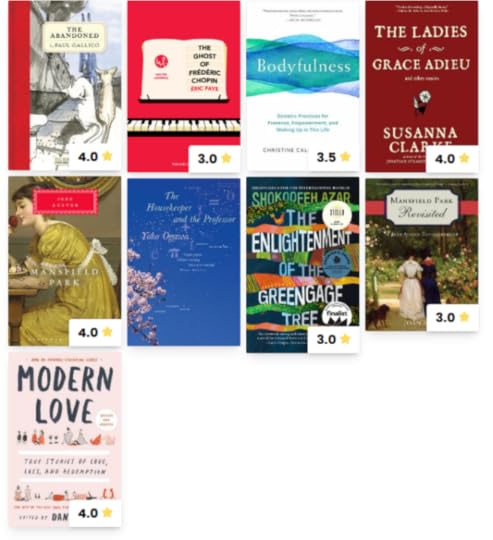 The Abandoned
by Paul Gallico – Reading the MeowThe Ghost of Frédéric Chopin by Eric Faye
Bodyfulness
by Christine CaldwellThe Ladies of Grace Adieu by Susanna Clarke – RereadMansfield Park by Jane Austen – Reread, Reading Austen 2025
The Housekeeper and the Professor
by Yoko OgawaThe Enlightenment of the Greengage Tree by Shokoofeh AzarMansfield Park Revisited by Joan Aiken – Reread
Modern Love
, edited by Daniel Jones
The Abandoned
by Paul Gallico – Reading the MeowThe Ghost of Frédéric Chopin by Eric Faye
Bodyfulness
by Christine CaldwellThe Ladies of Grace Adieu by Susanna Clarke – RereadMansfield Park by Jane Austen – Reread, Reading Austen 2025
The Housekeeper and the Professor
by Yoko OgawaThe Enlightenment of the Greengage Tree by Shokoofeh AzarMansfield Park Revisited by Joan Aiken – Reread
Modern Love
, edited by Daniel Jones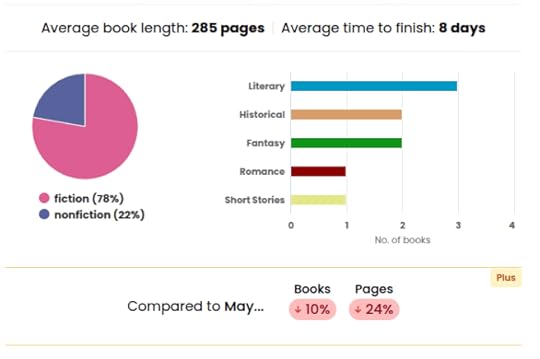 Three books about love – not necessarily romance
Three books about love – not necessarily romanceThe Housekeeper and the Professor was a brief, poignant portrait of a lovely non-romantic relationship between a brilliant man who’s lost his memory and a woman who finds new meaning (and mathematical wisdom) through caring for him.
The Abandoned (aka Jennie) took an imaginative leap into what it might be like to have to learn how to be a cat, again including poignant life lessons and a special friendship mixed in with all the adventure.
Modern Love was compulsively readable, with its many angles on all the joys and challenges of human intimacy, conveyed through brief, punchy essays drawn from the column in The New York Times. This would be my kind of beach reading, if I were going to the beach this summer.
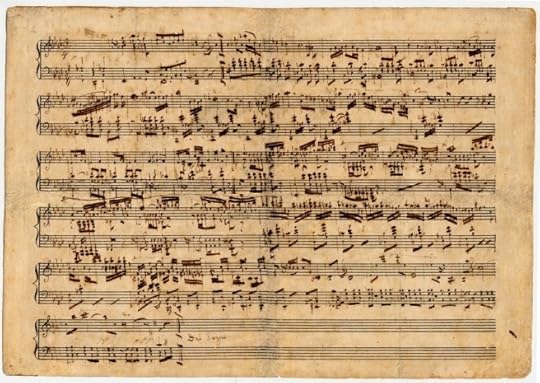 Frederic Chopin, Polonaise in F Minor, Op. 71, no. 3. From Gilmore Music Library, Yale UniversityA disappointment
Frederic Chopin, Polonaise in F Minor, Op. 71, no. 3. From Gilmore Music Library, Yale UniversityA disappointmentThe Ghost of Frédéric Chopin sounded so intriguing, but though it did manage to convey something of the unsettled atmosphere of post-Cold-War Prague, the story about a woman who claims to be channeling new compositions by Chopin just fizzled out at the end.
Currently readingI’ve been loving reading through the novels of Jane Austen in publication order; it’s fascinating to see how her writing developed. I’m now a few chapters into Emma, where all the elements are coming together brilliantly. So sad that there are only two more to go!
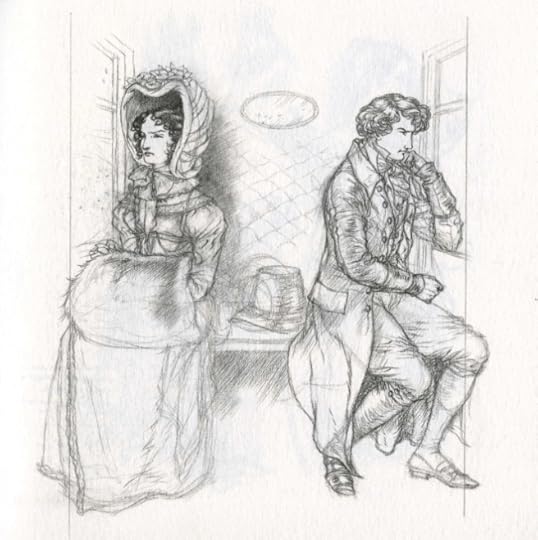 Preparatory sketch by Niroot Puttapipat for Folio Society edition – Emma and Mr EltonOn the blogThe Men of Mansfield ParkSix Years in Switzerland
Preparatory sketch by Niroot Puttapipat for Folio Society edition – Emma and Mr EltonOn the blogThe Men of Mansfield ParkSix Years in SwitzerlandWhat’s on your shelf this month?
Linked at The Sunday Post at Caffeinated Book Reviewer, the Sunday Salon at Readerbuzz, and the Monthly Wrap-up Round-up at Feed Your Fiction Addiction
June 22, 2025
The Men of Mansfield Park
This year, I’ve been reading through the novels of Jane Austen in publication order, something I don’t think I’ve ever done before. Thanks to the hosts of the Reading Austen 2025 event for putting me onto this project, and be sure to check out the other posts so far – lots of good stuff there.
The first half of the year has taken us through three books: Sense and Sensibility (1811), Pride and Prejudice (1813), and Mansfield Park (1814). The middle one of the sandwich has long been my favorite, but this time around I found myself with more thoughts burgeoning in connection with Mansfield Park. First of all it struck me that in certain ways it’s a reworking of motifs from Pride and Prejudice. For example, the plot turns upon the main female character bravely refusing the proposal of a man of good fortune, while the denouement is brought about by a (foster) sister’s elopement with an unreformed bad boy.
Originally, that elopement gave the hero a chance to show his true nature and regain his love by rescuing her sister from disgrace. In the reimagined version, this plot strand ends in tragedy, rather than being lifted into comedy — partly because rather than being separated into two people, one good and one bad, here the same man plays both parts, and is unable to save himself. Henry Crawford’s good side, it seems, came out when he fell in love with gentle Fanny Price, recognizing her value in a way nobody else in the book had done so far, but his bad side reasserted itself when he could not resist dallying with Maria Bertram. He’s sort of a Jekyll-and-Hyde character — and while I find his transformations are not sufficiently supported to make for a successful psychological study, he does indicate some of the potential for the rising new form of the novel to take on such material.
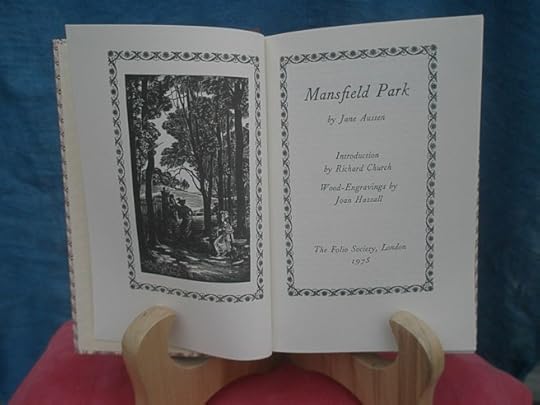 Mansfield Park, Folio Society edition, illustrated by Joan Hassall
Mansfield Park, Folio Society edition, illustrated by Joan HassallI think we’re so used to reading the kind of novels Jane Austen was instrumental in creating that we tend to forget how innovative this kind of thing was back then. She was demonstrating that the moral choices of individuals mattered — that not only the deeds of gods and heroes, or even kings and aristocrats, were important in shaping the world, but the deeds of very ordinary humans. She brought the stuff of mythology into the drawing room, clothing it in everyday drama, even in banal trivialities. And yet within such an unremarkable setting, people are given the chance to make choices that shatter or sustain life. With very small actions — a word, an attitude, a right or wrong way of thinking — they alter the course of their fortunes and the destiny of their families. And her novels continue to fascinate because this is our challenge, too.
Most of her books are also revolutionary in giving this kind of agency to women. But as I reread Mansfield Park, I noticed how the interesting moral developments actually belong to the male characters, at least in potential. Besides the example of Henry Crawford’s lost battle with his own double nature, there is Edmund Bertram, who ought to love Fanny but instead becomes infatuated with Henry’s sister Mary, an enchanting but unwholesome siren. Only Henry’s perfidy opens his eyes to the truth. And then there is Sir Thomas Bertram, who also in the end comes to admit Fanny’s true worth and recognize his responsibility in creating the conditions for his daughter Maria’s moral lapse.
These are characters who make major shifts in their worldview — but in a way that happens to the side, offstage, or in reported narrative, not giving us the full insight into their minds that we get with an Elizabeth Bennet or Emma Woodhouse. Austen is intrigued by the male potential for moral growth, a theme also central to her previous novel, but seems hesitant to fully embrace the male perspective. Maybe that’s one reason this book doesn’t quite satisfy me, but seems like a tantalizing gesture toward a kind of novel that Austen was not ready to write.
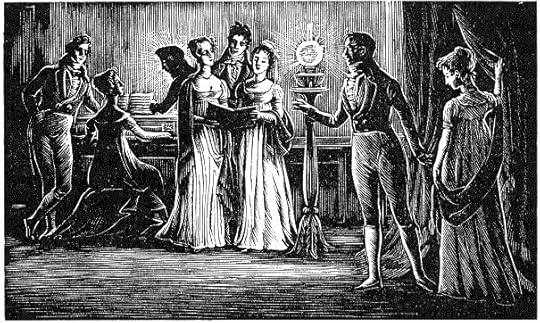 Rehearsing “Lover’s Vows”
Rehearsing “Lover’s Vows”Meanwhile, although she is the central character, Fanny is more of a spectator than a protagonist in this book, an observer of truth in a world where all is play-acting and layers of deception, including self-deception. With her dependent, impoverished status, ignored, overlooked, or even abused by all the others, there is not much she can do, other than perceive things as truly as she can. As with Elizabeth Bennet, her “fine eyes” are her best feature, at least in the metaphorical sense.
Meanwhile, perceiving Fanny’s beauty and value becomes a litmus test for the other characters, tending to turn her into an object for their powers of observation. She doesn’t change, and that’s the whole point. She is the one who sees the side of things that is lasting and worthwhile, and who silently calls for others to do the same.
This, again, can be frustrating for readers who expect something different from a protagonist. Fanny does undergo a transformation, but it’s subtle and happens only at the end of the story, during a visit back to her slovenly, vulgar parents’ house, when she finally gives up longing for a lost home and family, and transfers her allegiance fully to Mansfield. At first that struck me as a snobby valuing of money and comfort over family ties, but on reflection I think it’s meant to indicate that when people have fallen too far into the forces of degradation, one has to let them go and focus on a realm where change is still possible. Possibly for the very reason that they have the resources to not be completely preoccupied with survival, people like Edmund and Sir Thomas have the option to grow and make better choices — and Henry had that chance, but muffed it.
I’m so glad I reread Mansfield Park and found it more compelling than I’d remembered, even if not entirely successful. I’m very much looking forward to the second half of the year, to Emma, Northanger Abbey, and Persuasion. If you’re reading along, or have any reflections about Austen, please share your thoughts.

